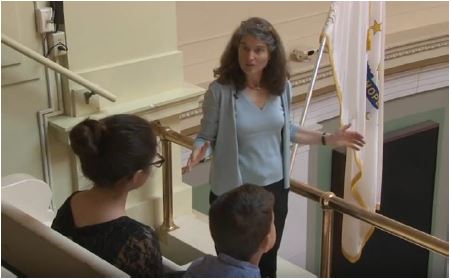Sherlock Center Initiates New Community of Practice for Teachers of Students with Complex Needs
July 8, 2020

|
In response to COVID-19, the Sherlock Center and the Rhode Island Department of Education (RIDE) are collaborating on a Community of Practice (COP) for teachers of students with complex needs. Teachers participating in the COP are providing instructions to students that often require unique and adapted instruction, as well as materials and supports to address their sensory, movement, and communication needs. With the COVID-19 national crisis forcing the closure of all Rhode Island schools, teachers had pivot to distance learning quickly. "Creating distance learning tools and strategies for students with complex needs is especially challenging" according to the Sherlock Center executive director, Amy Grattan. Dr. Grattan, along with colleagues, Dr. Susan Dell and Terri LaPlante, hold monthly meetings with the teachers. Recordings of the meetings and related resources are available to teachers via the Sherlock Center website.
The Community of Practice is open to all teachers, including those in pre-service. More than 200 teachers currently participate. Virtual meetings provide an opportunity for teachers to learn about national and local resources, as well as to share strategies, techniques and tools with each other. Sessions are organized by student age ranges (e.g., early childhood/elementary and secondary/transition) and teachers can earn professional development credits from RIDE for their participation. Rhode Island educators are working hard to support students and families during this crisis and to ensure students do not experience learning loss. The COP partnership with RIDE is one way that the Sherlock Center has been able to provide guidance directly to teachers of students with complex needs and to offer teachers the opportunity to connect on a regular basis.
The Community of Practice forums address a wide range of topics, including family engagement, social emotional learning, calming and movement strategies, and data collection for distance learning and ESY and how to ensure quality data points in online learning environments. Teachers use meeting time to brainstorm solutions unique to remote learning. For example, how best to collaborate with families to obtain accurate data to support IEP goals while limiting the amount of stress and responsibilities placed on families during the summer break.
An exciting project that has evolved from the COP is the creation of a virtual field trip bank. Members of the COP share tips on how to create accessible presentations, preserve confidentiality and access the statewide bank of field trips. The virtual field trips allow the opportunity for students and teachers to explore national and local places, as well as ways to incorporate virtual job and community research into student learning.
To learn more about this Community of Practices, visit the Sherlock Center's website at www.sherlockcenter.org or contact Dr. Amy Grattan at [email protected].







